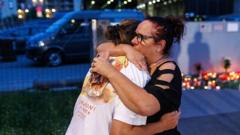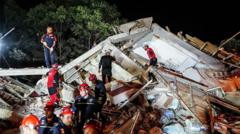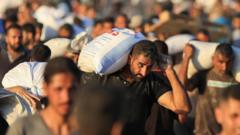A tragic school shooting in Graz resulted in the deaths of nine individuals, shaking Austria to its core. This article examines the incident from multiple angles, including the timeline of events, background of the shooter, the impact on the victims' families, and the broader implications for Austria's gun laws and societal safety.
Austria Shocked by School Shooting: A Deep Dive into the Tragedy

Austria Shocked by School Shooting: A Deep Dive into the Tragedy
A comprehensive analysis of the recent school shooting in Graz, Austria, exploring the details of the event, its victims, the shooter, and the implications of the country's gun laws.
Article Text:
On a tragic Tuesday morning in Graz, Austria, a school shooting unfolded at Dreierschützengasse secondary school, claiming the lives of nine individuals, including students and a teacher. The event, which took place at approximately 10:00 local time, has led to a national declaration of mourning. In addition to the fatalities, twelve individuals sustained injuries, with one succumbing to injuries later in the day.
Eyewitness accounts describe chaotic scenes as initial gunshots rang out. A student’s confusion turned panic as classmates rushed for safety upon realizing the shots were real. An adjacent resident reported hearing numerous shots, and police quickly reacted, bringing the situation under control within 17 minutes. The shooter, a 21-year-old man who was previously enrolled at the school, ended his own life shortly after the attack.
The shooter remains unnamed; however, authorities have disclosed he legally possessed two firearms and a firearms license. Investigations revealed a "farewell letter" and a malfunctioning pipe bomb in his residence, but police have yet to assign a clear motive for the tragic attack. Interior Minister Gerhard Karner confirmed that seven of the deceased were students, with many families now grieving the loss of their loved ones.
Austria’s gun laws are considerably permissive by European standards, with a significant number of civilians owning firearms. While machine guns are not allowed, weapons including pistols and rifles can be owned with appropriate permissions. The public reaction to this incident has raised concerns over gun control policies and the preparedness of schools for such events.
Historically, Austria has experienced a few school-related shootings with limited casualties. The recent mass shooting in Graz marks a significant intensification of fear surrounding public safety and education within the country, which has long viewed itself as a stable and secure environment.
Community members have come together to grieve, with vigils held to honor the victims. Local residents expressed shock, noting the rarity of such violence and the newfound unease that has settled over their city. As Austria grapples with this unprecedented tragedy, the focus will likely turn to evaluating gun regulations and ensuring the safety of its educational institutions for the future.
On a tragic Tuesday morning in Graz, Austria, a school shooting unfolded at Dreierschützengasse secondary school, claiming the lives of nine individuals, including students and a teacher. The event, which took place at approximately 10:00 local time, has led to a national declaration of mourning. In addition to the fatalities, twelve individuals sustained injuries, with one succumbing to injuries later in the day.
Eyewitness accounts describe chaotic scenes as initial gunshots rang out. A student’s confusion turned panic as classmates rushed for safety upon realizing the shots were real. An adjacent resident reported hearing numerous shots, and police quickly reacted, bringing the situation under control within 17 minutes. The shooter, a 21-year-old man who was previously enrolled at the school, ended his own life shortly after the attack.
The shooter remains unnamed; however, authorities have disclosed he legally possessed two firearms and a firearms license. Investigations revealed a "farewell letter" and a malfunctioning pipe bomb in his residence, but police have yet to assign a clear motive for the tragic attack. Interior Minister Gerhard Karner confirmed that seven of the deceased were students, with many families now grieving the loss of their loved ones.
Austria’s gun laws are considerably permissive by European standards, with a significant number of civilians owning firearms. While machine guns are not allowed, weapons including pistols and rifles can be owned with appropriate permissions. The public reaction to this incident has raised concerns over gun control policies and the preparedness of schools for such events.
Historically, Austria has experienced a few school-related shootings with limited casualties. The recent mass shooting in Graz marks a significant intensification of fear surrounding public safety and education within the country, which has long viewed itself as a stable and secure environment.
Community members have come together to grieve, with vigils held to honor the victims. Local residents expressed shock, noting the rarity of such violence and the newfound unease that has settled over their city. As Austria grapples with this unprecedented tragedy, the focus will likely turn to evaluating gun regulations and ensuring the safety of its educational institutions for the future.




















